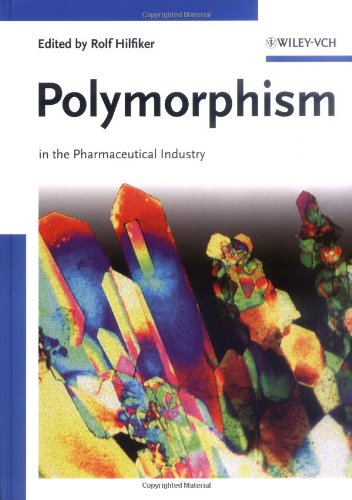Polymorphism in the pharmaceutical industry epub
Par jones flora le dimanche, juin 26 2016, 12:41 - Lien permanent
Polymorphism in the pharmaceutical industry by Rolf Hilfiker


Polymorphism in the pharmaceutical industry Rolf Hilfiker ebook
Page: 433
ISBN: 3527311467, 9783527311460
Format: pdf
Publisher: Wiley-VCH
Download Link: www.scribd.com/doc/50562565/Polymorphism-in-Pharmaceutical-Solids. Now, we are focusing on polymorphism and pseudo polymorphism, which is not only an academic challenge, but has great relevance for the pharmaceutical industry. Take any tiny hint that someone with a certain polymorphism responds badly to a particular drug, and industry will claim the gene is bad, not the drug. What are some of the applications of crystal engineering? Polymorphism in pharmaceutical solids by H. This case study demonstrates a large pharmaceutical contract manufacturing engagement in which there has been five years trouble free supply with OTIF (On-Time-InFull) consistently >95%. According to George Tranter from Chiralabs, “Crystallisation is one of the biggest problems of the pharmaceutical industry”. The Food and Drug Administration (FDA) is announcing the availability of a guidance for industry entitled ``Regulatory Classification of Pharmaceutical Co-Crystals.'' This guidance provides applicants of new drug Traditionally, solid-state polymorphic forms of an API are classified as either crystalline, amorphous, or solvate and hydrate forms, and applicable regulatory schemes for these solid-state polymorphic forms are well-defined. Another classic pharmacogenetic example is the study of thiopurine S-methyltransferase (TPMT, an enzyme which transfers methyl groups [CH3] to a sulphur-containing purine residue) genetic polymorphism (Figure 2A) (Weinshilboum and Sladek, 1980). Over the last twenty years, an enormous amount of effort has been expended by both the pharmaceutical industry and academia towards developing more powerful techniques and screening assays to identify the metabolic profiles and enzymes involved in drug These efforts are made in order to avoid latestage drug failure due to such factors as undesirable metabolic instability, toxic metabolites, drug-drug interactions, or polymorphic and saturation metabolism. What if scientists could make better use of technology to predict which drugs will work and pinpoint Now you need to know something about genetic polymorphisms (gene variants) that each individual may carry. Science, growing awareness of patients' needs, the hesitant but increasingly interested pharmaceutical industry, and government agencies are forging a movement towards personalization of drug treatments. Twenty years of industrial experience. Polymorphism of drugs has been the subject of intense interest in the pharmaceutical industry for over forty years. Most of all, other people can't stop you. Q: Is genomic sequencing also part of the picture? Every year, the pharmaceutical industry invests billions of dollars in testing drugs that are eventually abandoned because they don't work or cause side effects.